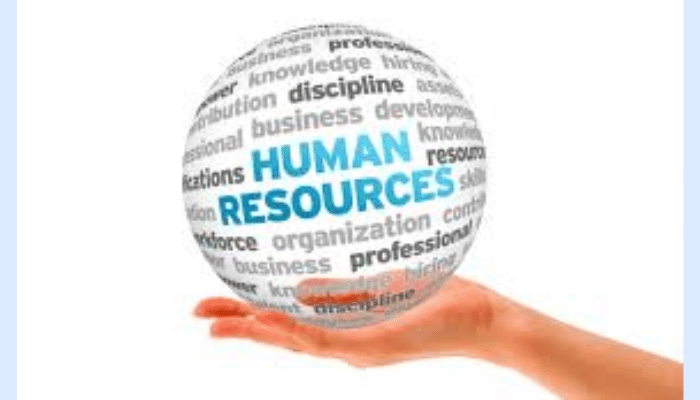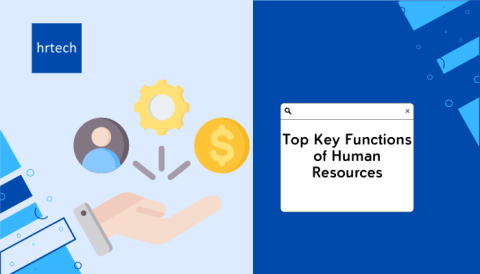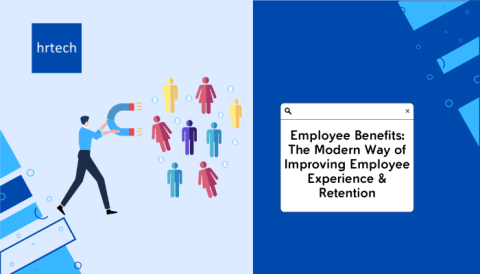Every successful business relies on a talented and motivated workforce to thrive. And that’s where the Human Resources (HR) department comes in. HR professionals are the backbone of any organization, responsible for attracting, hiring, developing, and retaining the best employees.
They work tirelessly to create a positive and empowering work environment, ensuring that every member of the team is happy, healthy, and productive. HR is involved in every aspect of the employee life cycle from recruitment to benefits administration. So, if you want your business to succeed, you need to understand HR’s critical role in driving growth and achieving your goals.
Definition of Human Resources (HR):
Human Resources (HR) can be defined as the department within an organization that is responsible for managing the employee life cycle. This includes attracting, recruiting, developing, and retaining talent. HR professionals work closely with employees at all levels, from entry-level positions to executive leadership. They ensure that the organization remains compliant with labor laws, offers competitive compensation and benefits, and fosters a positive and inclusive work environment.

Core Functions and Responsibilities of HR:
Human resource planning: Human resource planning involves analyzing the current and future workforce needs of the organization. HR professionals assess the skills and competencies required for various roles and develop strategies to attract, develop, and retain the right talent. They consider factors such as employee turnover, retirements, and organizational growth to ensure that the organization has the necessary workforce to meet its objectives.
Labor law compliance for ensuring business operations adhere to legal standards: HR professionals are responsible for ensuring that the organization complies with labor laws and regulations. They stay updated on changes in employment legislation and ensure that the organization’s policies and practices align with these laws. This includes areas such as minimum wage requirements, working hours, leave entitlements, and workplace health and safety.
Recruitment, candidate selection, and hiring practices including internal and external methods: Recruitment is a critical function of HR. HR professionals develop recruitment strategies to attract a diverse pool of qualified candidates. They utilize various methods such as job postings, networking, employee referrals, and partnering with recruitment agencies. Once candidates are identified, HR professionals conduct interviews, assess their qualifications, and select the most suitable candidates for the organization.
Onboarding and offboarding processes to facilitate employee integration or separation:HR manages the onboarding process for new employees, ensuring that they have a smooth transition into the organization. This includes providing necessary paperwork, introducing them to the company culture, and facilitating training and orientation programs. Similarly, HR handles the offboarding process when an employee leaves the organization, ensuring a seamless departure and proper documentation.
Compensation planning to ensure competitive and fair salaries: HR professionals are responsible for developing competitive and fair compensation plans. They conduct market research to determine appropriate salary ranges for different roles and ensure that employees are compensated accordingly. HR also manages the administration of benefits such as health insurance, retirement plans, and other employee perks.
Performance management for aligning employee achievements with business goals: Performance management is a crucial responsibility of HR. HR professionals work with managers to set performance goals, provide feedback, and evaluate employee performance. They develop performance appraisal systems that align individual achievements with the organization’s overall goals. HR also plays a role in identifying and addressing performance issues and providing coaching and support to help employees improve.
Learning and development opportunities for employee skill enhancement: HR professionals identify employees’ training and development needs and design programs to enhance their skills and knowledge. They collaborate with managers to create individual development plans and provide learning resources, such as workshops, seminars, and online courses. HR also evaluates the effectiveness of training programs and makes necessary adjustments to ensure maximum impact.
Career planning to provide growth paths within the organization:HR professionals assist employees in career planning, helping them identify growth opportunities within the organization. They provide guidance on career paths, promotion criteria, and skill development necessary for advancement. HR also facilitates internal mobility, allowing employees to explore different roles and departments to expand their knowledge and skills.
Function and job role evaluation for optimal organizational structure: HR professionals evaluate the functions and job roles within the organization to ensure an optimal organizational structure. They analyze job descriptions, responsibilities, and reporting lines to determine efficiency and effectiveness. HR may recommend changes in job roles, reorganization, or process improvements to optimize the organization’s structure.
Employee rewards and recognition to boost morale and productivity: HR professionals implement employee rewards and recognition programs to boost morale and productivity. They design programs that acknowledge and appreciate employee contributions, whether through monetary rewards, incentives, or non-monetary recognition. HR also promotes a culture of appreciation and celebration, fostering a positive work environment.
Benefits management, including health plans and wellness programs: HR professionals manage employee benefits, including health plans and wellness programs. They negotiate and select appropriate health insurance plans, retirement options, and other benefits that support employee well-being. HR also promotes wellness initiatives such as fitness programs, stress management workshops, and mental health resources to ensure a healthy and balanced workforce.
Industrial relations, including collective bargaining agreements and grievance processes: HR professionals handle industrial relations, including collective bargaining agreements and grievance processes. They work closely with employee unions or representatives to negotiate fair terms and conditions of employment. HR also handles employee grievances, providing a fair and transparent process for resolving conflicts.
Employee engagement and communication to foster a positive workplace culture: HR professionals play a vital role in fostering employee engagement and communication. They develop strategies to ensure that employees are informed, involved, and connected to the organization’s goals and values. HR facilitates communication channels such as town hall meetings, employee surveys, and feedback sessions. They also organize employee engagement activities and events to promote team building and a positive workplace culture.
Employee record keeping for administrative compliance: HR professionals maintain accurate and up-to-date employee records to ensure administrative compliance. This includes personnel files, payroll records, performance evaluations, and other relevant documentation. HR also ensures that employee data is handled securely and confidentially, adhering to data protection regulations.
Workforce health and safety measures: HR professionals are responsible for implementing workforce health and safety measures. They ensure that the organization provides a safe and healthy work environment, complying with occupational health and safety regulations. HR develops policies and procedures for accident prevention, emergency response, and workplace wellness. They also conduct training sessions to educate employees on safety protocols and promote a culture of safety.
Employer branding to attract and retain talent: HR professionals play a crucial role in building and maintaining the employer brand. They develop strategies to attract top talent and retain existing employees. HR promotes the organization’s values, culture, and opportunities for growth to position it as an employer of choice. They also manage the employer brand through effective communication, recruitment marketing, and employee testimonials.
How HR Supports Employees:

Transforming HR through Agile Workforce Solutions
1. Offering avenues for advancement and transfers to motivate employees
HR provides employees with opportunities for advancement and transfers within the organization. They develop career paths, identify potential growth areas, and communicate these opportunities to employees. By offering avenues for advancement, HR motivates employees to challenge themselves, acquire new skills, and contribute to the organization’s success.
2. Overseeing professional development and education assistance programs
HR oversees professional development and education assistance programs for employees. They provide resources and support for employees to pursue further education, certifications, or professional training. HR professionals work closely with employees to identify their career goals and provide guidance on development opportunities that align with their aspirations.
3. Improving leadership knowledge and skills of managers
HR plays a critical role in improving the leadership knowledge and skills of managers. They provide training programs and workshops that focus on leadership development. HR professionals also offer coaching and mentoring opportunities to enhance managerial competencies. By investing in leadership development, HR contributes to the overall effectiveness of the organization.
4. Managing health plans, wellness programs, and benefits to support employee health
HR manages health plans, wellness programs, and benefits to support employee health and well-being. They negotiate and select appropriate health insurance plans, employee assistance programs, and wellness initiatives. HR professionals also educate employees on the available resources and promote a healthy lifestyle within the organization.
Types of Human Resources Support:
Differences between internal HR departments and external HR partners:
There are different approaches to accessing HR support, either through an internal HR department or external HR partners. Internal HR departments are part of the organization and work exclusively for the organization’s employees. They have an in-depth understanding of the company culture, policies, and processes. External HR partners, such as HR outsourcing firms, PEOs (Professional Employer Organizations), ASOs (Administrative Service Organizations), or managed services providers, offer specialized HR expertise and services on a contractual basis.
Advantages of having an internal HR team for familiarity and efficiency:
Having an internal HR team brings several advantages. They have a deep understanding of the organization’s culture, values, and specific needs. They can tailor HR practices to align with the organization’s goals and objectives. Internal HR teams also have direct access to employees and can provide personalized support and guidance. Additionally, internal HR teams can quickly respond to changing needs and address employee concerns efficiently.
External HR solutions for specialized HR expertise:
External HR solutions, such as HR outsourcing, PEOs, ASOs, or managed services providers, offer specialized HR expertise and services. They bring in-depth knowledge and experience in various HR functions and can provide innovative solutions to complex HR challenges. External HR partners often have access to advanced HR technologies and resources that may not be available to internal HR teams. By outsourcing HR functions, organizations can focus on their core business while ensuring access to comprehensive HR support.
Human Resources Job Roles:
1. Benefits administrator – Manages benefits selection and updates:
A benefits administrator is responsible for managing employee benefits programs. They research, select, and update benefit options, ensuring that they align with employee needs and regulatory requirements. Benefits administrators also handle employee inquiries, and claims, and provide guidance on benefit plans.
2. Employee relations manager – Builds and maintains employee relationships:
An employee relations manager focuses on building and maintaining positive employee relationships. They handle employee inquiries, concerns, and conflicts, ensuring timely resolution. Employee relations managers also promote a positive work environment and foster a culture of open communication and collaboration.
3. Human resources assistant – Supports HR management with administrative tasks:
A human resources assistant provides administrative support to the HR department. They assist with tasks such as maintaining employee records, processing paperwork, scheduling interviews, and coordinating training programs. HR assistants play a crucial role in ensuring the smooth functioning of HR operations.
4. Human resources director – Oversees HR department compliance:
A human resources director is responsible for overseeing the HR department’s compliance with labor laws and regulations. They develop HR policies, and procedures, and ensure their implementation. HR directors also provide guidance to HR staff, handle employee grievances, and ensure the organization’s HR practices align with legal requirements.
5. Human resources generalist – Manages HR operations in smaller companies:
A human resources generalist manages HR operations in smaller companies. They handle a wide range of HR functions, including recruitment, training, benefits administration, employee relations, and compliance. HR generalists provide support to employees and managers across various HR areas.
6. HRIS analyst – Manages technology within HR:
An HRIS (Human Resources Information System) analyst manages the technology and systems used within HR. They ensure the effective implementation and utilization of HRIS platforms, databases, and other HR technologies. HRIS analysts provide support, troubleshoot technical issues, and ensure data accuracy and integrity.
7. Labor relations specialist – Assists with collective bargaining:
A labor relations specialist assists with collective bargaining processes between the organization and employee unions or representatives. They negotiate labor agreements, handle grievances, and ensure that the organization remains compliant with labor laws and regulations.
8. Recruiter – Sources candidates for open positions:
A recruiter is responsible for sourcing and attracting candidates for open positions within the organization. They utilize various methods, such as job postings, networking, and recruitment agencies, to identify qualified candidates. Recruiters screen resumes, conduct interviews and select the most suitable candidates for further consideration.
9. Training and development specialist – Implements employee training programs:
A training and development specialist designs and implements employee training programs. They assess training needs, develop training materials, and deliver training sessions. Training and development specialists also evaluate the effectiveness of training programs and make necessary adjustments to ensure maximum impact.
Skills Required in Human Resources:
Active listening for understanding employee perspectives: Active listening is a crucial skill for HR professionals. It allows them to understand employee perspectives, concerns, and needs. By actively listening, HR professionals can provide appropriate support and guidance, fostering a culture of open communication and trust.
Analytical skills for evaluating recruiting methods and performance management: Analytical skills are essential for HR professionals to evaluate and improve recruiting methods and performance management processes. They analyze data, identify trends, and make data-driven decisions to enhance these HR functions. Analytical skills also help HR professionals identify areas for improvement and implement effective strategies.
Administrative competencies including organization and multitasking: Strong administrative competencies are vital for HR professionals. They need to effectively organize and manage various HR tasks, such as employee records, benefits administration, and recruitment processes. Multitasking is also crucial to handle multiple HR functions simultaneously and meet deadlines.
Effective communication for engaging in interviews and training: Effective communication skills are essential for HR professionals to engage in interviews and training sessions. They need to clearly articulate job requirements, and company policies, and provide feedback to candidates and employees. Effective communication also helps HR professionals build rapport and trust with employees and managers.
Development and delivery of training sessions: HR professionals need to have the ability to develop and deliver training sessions effectively. They should be skilled in designing training materials, using engaging delivery methods and assessing training outcomes. The ability to facilitate learning and create an interactive and impactful training environment is essential.
Conclusion:
In conclusion, Human Resources (HR) is pivotal to the success of any organization. From managing the employee life cycle to fostering a positive work environment, the contributions of HR professionals are indispensable. If you want to stay updated on the latest HR trends and insights, explore our hrtech blog for relevant content and valuable insights.
Stay ahead of the curve with our hrtech company blog and gain actionable insights for your HR strategies!





